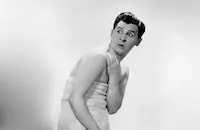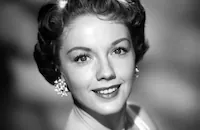About Face

Brief Synopsis
Cast & Crew
Roy Del Ruth
Gordon Macrae
Eddie Bracken
Dick Wesson
Virginia Gibson
Phyllis Kirk
Film Details
Technical Specs

Synopsis
Roommates Tony Williams, Boff Roberts and Dave Crouse, who are seniors at Southern Military Institution, make plans for a weekend of festivities surrounding the academy's baseball game against the North Carolina Tarheels. Before Tony and Boff leave for the train station to pick up their girl friends, Lorna Carter and Alice Wheatley, another student, Hal Carlton, smugly tells Tony that, because of Tony's pranks during Lorna's last trip, her mother has arranged for Hal to be Lorna's escort. Hal's victory over Tony is short-lived, as underclassman Bender delivers a telegram stating that Lorna has the measles and must cancel her trip. Bender also informs Boff that Lt. Jones, the school's chemistry instructor who has eyes for Alice, has summoned Boff to his office to grade papers, which will cause him to miss meeting Alice's train. After Hal leaves, Tony, who arranged for the bogus telegram to be sent to Hal, prepares to meet Lorna. In Jones's office, while Boff grades papers, the lieutenant douses his hair with hair tonic, unaware that Tony has added vegetable dye to the bottle. When Tony drops by, Boff, unable to leave, gives him fifty dollars, asking Tony to deposit it in his account to cover checks he has written. Meanwhile, on the train, Lorna and Alice chat with Betty, the daughter of Col. Long, who is the academy's new commandant. Betty, who has no one waiting for her at the station, complains that she is never sure if boys truly like her or pretend to like her to impress her father. Impulsively, she decides to keep her identity secret for the weekend and asks the other girls to introduce her as "Betty Short." Lorna is pleased to find Tony, instead of Hal, waiting for her at the station, but Alice hides her disappointment when Jones, rather than Boff, meets her. After introducing Dave to Betty, Alice and Lorna go to the home of Lorna's mother, Mrs. Carter, but Jones makes an embarrassed retreat when he realizes that his hair has turned bright green. Boff joins them later, and when he and Alice, whom he has secretly married against school regulations, slip away to talk, she surprises him with news that she is pregnant. During assembly that afternoon, a dazed Boff, who gets distracted by babies among the spectators, wanders off the field to admire them and is later reprimanded by Col. Long. After returning to the dorm room, Boff confides to Tony and Dave that he and Alice are married and expecting a child. Knowing that Boff will be expelled if word gets out, his roommates vow to help him, and urge him to concentrate on the baseball game, in which he is pitching. That evening, during pre-game festivities in the courtyard where the school mascot, a wooden Indian, stands, Tony bets Boff's money on SMI's victory. Later, Dave is caught by Col. Long wooing Betty and is dismayed when she accuses the colonel of spying. The colonel, keeping a promise he made to her, refrains from revealing that Betty is his daughter. That evening, Tony and Dave break curfew to be with Lorna and Betty, but Hal sees them and anonymously reports them to Jones. At Mrs. Carter's house, Tony accidentally spills water on his pants and is wrapped in a towel when Jones and Col. Long show up. Tony and Dave are subsequently confined to quarters and barred from attending the baseball game. The next day, Boff, feeling nervous and alone, pitches poorly and is knocked out by a ball and returned to his dorm room. There he communicates with Bender by walkie-talkie, and the boys learn about their team's victory. Col. Long, having been notified by the bank that Boff has been passing worthless checks, orders all three roommates to march three months of penalty tours. Although the roommates' time is preempted by marching, Tony continues to deal with their rivals. When Jones tries to take Alice and Betty to the theater, he finds that his hair has turned orange. Then, after Tony learns that it was Hal who reported their running the block, Hal's uniform is rigged to self-destruct at the next review parade. Finally, Tony, Boff and Dave complete their sentence near the end of the school term, but Boff has little time to study chemistry and fears he will fail the class. On the night before the test, Tony sneaks Betty, who is an excellent chemistry student, into the dorm room to help Boff study. Hal catches them, but when Betty reveals that she is the colonel's daughter, he decides he is better off keeping the secret. Later, Boff learns that he has passed chemistry and become a father. After the graduation ceremony, everyone, including a blue-haired Jones, celebrates at the cotillion.

Director

Roy Del Ruth
Cast

Gordon Macrae

Eddie Bracken

Dick Wesson

Virginia Gibson

Phyllis Kirk
Aileen Stanley Jr.

Joel Grey

Larry Keating
Cliff Ferre
John Baer

Mabel Albertson

Jimmy Best
Richard Monahan
Russ Clark
Ferris Taylor
Freeman Lusk
Rochelle Stanton
Donald Kerr

Roy Del Ruth
Hazel Shaw
Lonnie Pierce
Patricia Hawks
Crew
Wesley Anderson
Gordon Bau
Gibson Carter
Pat Clark
Charles H. Clarke
Wilfrid M. Cline
Joe Conners
Mel Dellar
Jerry Ewing
David Forrest
Bud Friend
Bert Glennon
Ray Heindorf
Elva Hill
Gus Hyland
William Jacobs
Mitchell Kovaleski
Sgt. August Kunkel
Emile La Vigne
Ann Locker
Norman Luboff
Dude Maschmeyer
Peter Milne
Lou Molina
Jack Morton
James Murray
Ralph Owens
Pat Patterson
Frank Perkins
Leroy Prinz
Tony Redondo
Lyle B. Reifsnider
Thomas Reilly
Leah Rhodes
C. A. Riggs
June Rollens
Peter De Rose
Carole Shannon
Tillie Starriett
William Studeman
Charles Tobias
Vic Vallejo
Alma D. Young

Film Details
Technical Specs

Articles
About Face (1952)
by Glenn Erickson

About Face (1952)
Quotes
Trivia
Joel Grey's film debut.
Notes
An August 1951 Hollywood Reporter news item reported that Gene Nelson had initially been cast in the film. About Face marked the film debuts of Joel Grey, a protégé of Eddie Cantor, Mabel Albertson and Aileen Stanley, Jr., according to August and September 1953 Hollywood Reporter news items and Warner Bros. production notes. The production notes also add to the cast Patricia Hawks, daughter of former actress Bessie Love. Although her appearance has not been confirmed, September 1953 Hollywood Reporter news items add Doris Fulton to the cast. An August 1951 Hollywood Reporter news item stated that director Roy Del Ruth played a professor in the film. College exteriors were shot at the campus of the University of California at Los Angeles.
An August 1952 Variety news item reported that Warner Bros. was being sued over their use of the title About Face, as it conflicted with the 1942 United Artists picture, titled About Face, which was produced by Hal Roach. The plaintiffs were Favorite Films Corp. and Favorite Films International Corp., who owned reissue rights to the 1942 film, and Regal Television Corp., who picked up the television rights. The outcome of the lawsuit has not been ascertained. Warner Bros. made an earlier adaptation of John Monks, Jr. and Fred F. Finklehoff's play, the 1938 film Brother Rat, which was directed by William Keighley. For more information about the 1938 film, its sequel, and the play Brother Rat, see the entry in AFI Catalog of Feature Films, 1931-40.














